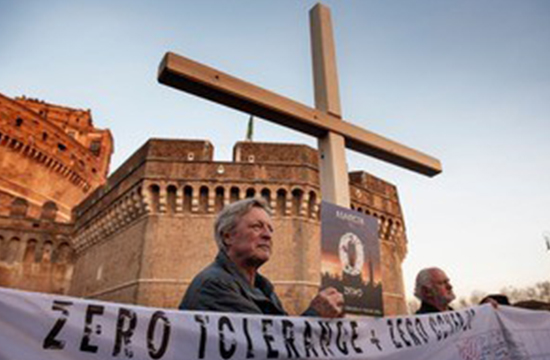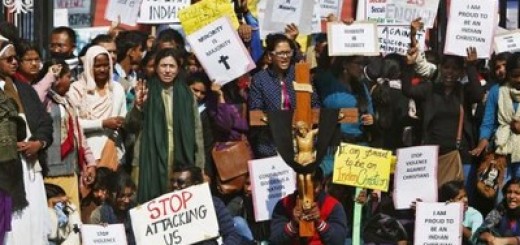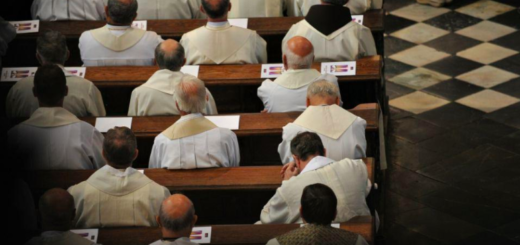Long awaited action – Sexual abuse: Pope abolishes ‘Pontifical Secret’

Church files are now open to national courts — a long awaited demand by the victims
LA CROIX INTERNATIONAL
Nicholas Senez
Vatican City
18th December 2019
Cover image: A demonstration was held against clerical abuse in Rome on the occasion of the summit on sexual abuse in the Church past February
Pope Francis has done his bit. On Dec. 17 he abolished the "pontifical secret" that covered the Church's internal procedures on sexual abuse of minors up to the age 18 years. This historic act was long-awaited by victims of sexual abuse.
Will our Indian Church abide by the Pope's pronouncement? Or will it still mainain ostrich-like attitude? However, Pope's pronouncement does not cover sexual abuse of women, specifically of nuns within the four walls of the Church by Mulakkal and his ilks. May be we have to wait and watch out for further pronouncements on this. Isaac Gomes, Asso. Editor, Church Citizens' Voice.
Pope Francis on Dec. 17 abolished the "pontifical secret" that covered the Church's internal procedures on sexual abuse of minors. This historic act was long-awaited by victims of sexual abuse.
As this crime is considered serious by the Church, its judgment was reserved by the Congregation for the Doctrine of the Faith since 2001.
This exclusive Roman privilege had a downside: the obligation of reservation on all papal works, which is referred to as "pontifical secret."
This one could go a long way. Victims narrated the difficulty, if not impossibility, in knowing where their case stood, sometimes incidentally learning that their attacker had been convicted (or cleared) and what sentence had been given to him.
In some cases, this secrecy by the Vatican made it difficult to enforce laws effectively.
These questions were raised at the episcopal conferences, convened last February, in the Vatican. At the time, Frenchman Olivier Savignac was among the victims who interacted with several participating cardinals.
"I had felt them at odds: with the will to do something but, at the same time, stuck by the inertia of the Holy See," he says, rejoicing today that "it is the willingness to be open and to work with the authorities."
The pope's text states that "denunciations, procedures and decisions" relating not only to sexual abuse of minors and vulnerable persons, but also to child pornography are not covered by the papal secrecy.
Another papal text, published on the same day, increases the coverage of these crimes from 14 to the age of 18 .
The pontifical secret cannot be invoked if the case also concerns another subject that remains covered under the secrecy clause.
Under the "You are the light of the world," doctrine, priests have to report abuses to their superiors. The doctrine specifies that secrecy does not prevent compliance with state laws.
Primacy of the victims
"This means that complaints, testimonies and trial documents relating to sexual abuse cases kept in the archives of the Holy See's dicasteries and in dioceses may be handed over to the civil investigating agencies," explains Andrea Tornielli, editorial director of the dicastery for communications of the Holy See.
As far as the Vatican is concerned, each state may act within the framework of an international letter rogatory.
In substance, the papal text puts the papal secret in its rightful place: a duty of reserve specific to the papal administration but in no way comparable with the confessional secret whose absolute character the Vatican had recalled at the beginning of the summer.
The papal decision follows the values, considered worthy of special protection today, said Giuseppe Dalla Torre, former president of the Vatican court, who stressed "the primacy of the victims".
Finally a positive change
The papal text stresses on "the security, integrity and confidentiality" of the proceedings to protect the reputation of all the persons involved."
But there is no way that this will be used to protect aggressors and gag the victims.
"The person who makes the report, the person who claims to have been assaulted and the witnesses cannot be subjected to any obligation of silence regarding the facts in question", insists the pontifical decree.
"This is great news. Finally, a real and positive change," says Marie Collins, an Irish victim of a priest and a former member of the Pontifical Commission for the Protection of Minors, an organization that, during its first mandate, had asked the pope to put an end to this secret.
For victims, the text arrives 'very late'
Savignac, for his part, is also pleased with another decision taken in parallel by the pope – making available a lawyer trained in canon law to lay people. It is reported to be difficult for the victims to seek a priest to represent them.
"It is also the end of an inner self of the Church's justice that inevitably led to a kind of moral and spiritual conflict of interest," Savignac says with satisfaction.
However, for some victims, such as François Devaux, of La parole libérée (The Free Speech), this papal text arrives "very late".
"This decision of the pope was taken under public pressure more than out of conviction," said Doris Wagner, a former nun abused by a priest.
For the one whose aggressor was finally acquitted by the Vatican, "there is still much to be done to get out of the culture of non-transparency that permeates the Church and the Curia".

















